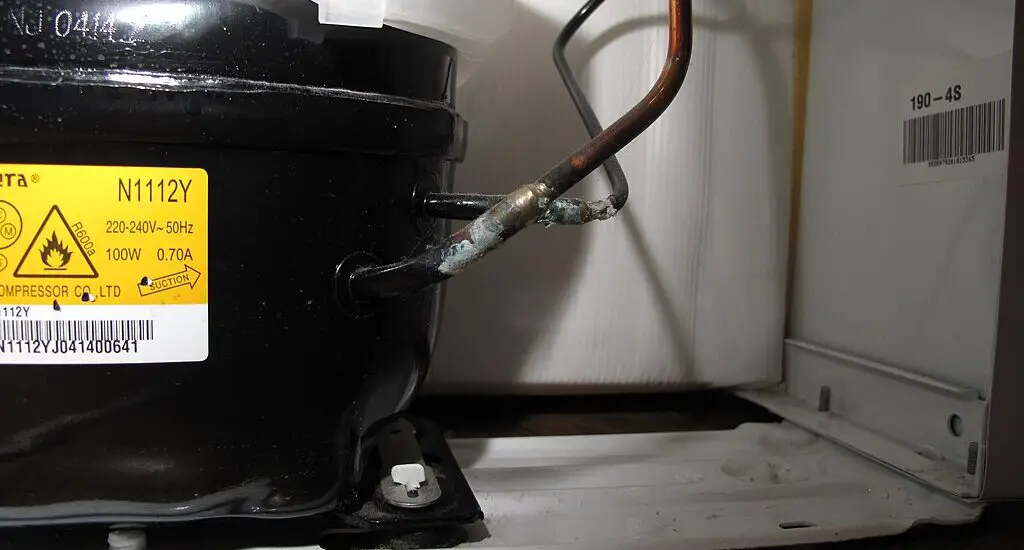What happens when a fridge compressor fails is a concern for many homeowners. As a crucial component of your refrigerator’s cooling system, understanding its failure and how to address it can save you both time and money. Let’s explore every detail of this topic.

Table of Contents
Signs Your Compressor Might Be Failing
A failing compressor can manifest in various ways. Noticing these signs early can save you from major inconveniences, food spoilage, and increased repair costs:
Warm Temperatures Inside the Fridge
One of the most immediate signs of a failing compressor is a refrigerator that’s not cooling properly. While the set temperature might seem fine, the inside remains warm. This is because the compressor, responsible for circulating refrigerant and removing heat, isn’t performing efficiently.
Strange Noises
A healthy fridge operates with a consistent hum. However, if you begin to hear unusual sounds like buzzing, rattling, or louder-than-usual humming, it’s an indication the compressor is struggling. These noises arise when motor components wear out or when there’s pressure build-up inside the compressor.
Excessive Cycling
Your refrigerator’s compressor cycles on and off to maintain the desired temperature. But if you find it frequently cycling, it indicates an overworking compressor. Factors like dirty coils, a damaged thermostat, or low refrigerant levels can cause this excessive cycling, leading to more wear and tear on the compressor.
Pooling Water
A malfunctioning compressor can’t maintain optimal temperatures. Consequently, the frozen items may begin to melt, leading to water pooling inside or under the fridge. While other issues might cause pooling, a failing compressor is a common culprit.
What to Do If Your Compressor Fails
Discovering a failed or failing compressor can be alarming, but taking the right actions can mitigate potential damage and costs. Here are the steps to guide you:
Call a Professional
Before jumping to conclusions, it’s crucial to get a second opinion. A professional technician will diagnose the exact cause of the malfunction. Working with electrical appliances can be hazardous, and handling refrigerants requires special certification. Technicians have the necessary tools and expertise to safely evaluate and repair any issues.
Replace the Fridge
Sometimes, the cost of replacing a compressor, especially for an older refrigerator, can be almost equivalent to buying a new one. When considering this option, factor in the age of the fridge, the potential energy savings of newer models, and the possibility of recurrent issues with the old unit.
Use Backup Cooling
While awaiting repairs or deciding on the next steps, it’s important to ensure your food doesn’t spoil. If you have a secondary fridge or a cooler, transfer perishables there. If neither is available, consuming or preserving the perishables (like cooking or freezing) is advisable. Always prioritize food safety.
Ensure Proper Power Supply
On rare occasions, the issue might not be with the compressor but with the power supply. Check the power cord, outlet, and circuit breaker to ensure they are functioning correctly. Sometimes, simply resetting the circuit breaker or changing the outlet can resolve the issue.
Check out these other articles…
Refrigerator Compressor Upside Down: 5 Easy Steps to Fix It
Which Type of Compressor is Best for Refrigerator? Revealed
Refrigerator Compressor Vacuum Pressure: Comprehensive Guide
Does a Refrigerator Have 2 Compressors? Unveiling the Truth
Do Refrigerators Have Two Compressors? Comprehensive Answer
5 Types of Refrigerator Compressor: Essential Knowledge
How Do I Know What Size Compressor I Need for My Refrigerator?
Prevention is Key
A little preventive care goes a long way. Here’s how you can prevent future compressor problems:
Regular Maintenance: Have your fridge serviced regularly by professionals. They can catch minor issues before they escalate.
Clean the Coils: Dust and debris on the coils make the compressor work harder. Clean them at least twice a year.
Ensure Proper Ventilation: Always maintain adequate space around your fridge for proper ventilation. This helps the compressor run efficiently.